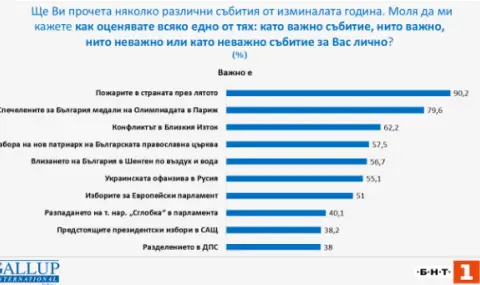What is important is what is close, what is immediate, what affects most directly. The scandals, divisions and dynamics of domestic political life, which have become the center of public debate in the country, seem to remain in a more lateral than central place in the eyes of Bulgarians, while key international events have been pushed to the sidelines of public consciousness. This is shown by the results of a nationally representative survey conducted by “Gallup International Balkan“ specially for BNT.
Respondents were asked to give their assessment for each of a set of key events on a national and international level that marked the passing year of 2024 - what is important and what is not important to them personally. The results do not represent a ranking, and the respondents did not rank the events - a separate assessment was given for each of them. The arrangement by answers "important" however shows an interesting picture of 2024 in the eyes of Bulgarians.
It is not surprising that the devastating fires of this summer were assessed as most important. It is precisely the immediate threat, as well as its direct expressions and causes, that put fires in a leading position among our society. A significant majority of 90.2% indicate that this is important to them personally.
The attitudes are unambiguous, and minimal shares assess the fires as something unimportant (3.5%) or occupy a position in the middle.
However, the positive for the country also occupies a leading place in the assessments of Bulgarians.
The medals won by Bulgarian athletes during the Olympics in Paris this year were assessed as important by 79.2% of the public in our country.
One tenth (10.5%) do not accept them as either important or unimportant, and few are those who do not see the medals won as important or cannot assess them.
From a year saturated with events in the international plan, Bulgarians single out the conflict in the Middle East. Two-thirds (62.2%) of the public in our country indicate that what is happening there is important to them, for one tenth the intense fighting in the Middle East is not important, and about 20 percent stand in the middle.
The Ukrainian offensive in Russia since the summer of this year is also assessed as rather important - 55.1% of Bulgarians answer this way, but further back in comparison with other events on a national and international level. Although much closer to us and with much more immediate importance, the fighting between Russia and Ukraine is perhaps increasingly becoming a stress to which Bulgarians are accustomed.
Another international event that received a wide response in the Bulgarian public and political debate - the elections in the US, is rather not recognized as very important by a significant part of our society. The question about the key vote in the US was asked before the vote, but even then its results were interpreted by observers as significant for the development of national and international processes. Bulgarians are rather divided - approximately equal shares answer “it is important“ (38.2%) and “it is not important“ (34.3%).
About one fifth of those surveyed remain in the middle.
The European Parliament elections, however, being part of both national political life and Bulgaria's membership in the Union, are assessed as important by more than half of those surveyed (51%). About one fifth assess the elections for representatives in the European Parliament as unimportant (20.4%) or neither important nor unimportant (22.8%).
Bulgaria's entry into Schengen by air and by sea finds its place among the more important events for Bulgarians in the past year. 56.7% say that our partial acceptance into Schengen is important to them personally. 19.4% take a middle position, and 17.9% do not recognize the event as important. Thus, it seems that, even if incompletely, the abolition of borders (with the exception of land borders) has been recognized as a success and has been assessed as important in the daily lives of Bulgarians.
Another event of a purely national nature occupies a high place among the important things of the year - the election of a new patriarch of the Bulgarian Orthodox Church (important for 57.5% of respondents). Events from the country's church agenda rarely stand out as significant in the daily lives of Bulgarians. However, the election of a patriarch has apparently received its special assessment among our society - not only as one of the rather positive events of the year, but also as one that managed to guarantee public peace and a sense of unity in the nation (against the backdrop of many others that caused divisions).
Without being deliberately ranked, but still significantly lower in the peculiar arrangement, are two events from the country's domestic political life that took over the public agenda during the year. The collapse of the so-called “assembly“ in parliament was assessed as important by a relative majority of 40.1% of all respondents. A quarter (26%) say that this is not important to them, and 23.6% choose the option “neither“.
The split in the MRF was assessed as important by 38% of Bulgarians surveyed and received the least such responses of all the previously set events. One third (32%) do not see the collapse of one of the main parties after the transition as something important, and 23.1% take a more neutral position “neither important nor not important“.
The survey was conducted between September 28 and October 6, 2024 among 806 people using the “face-to-face“ method with tablets. The sample is representative of the adult population of the country. The maximum standard deviation is ±3.5% at 50 percent shares. 1% of the sample is equal to about 54 thousand people.
